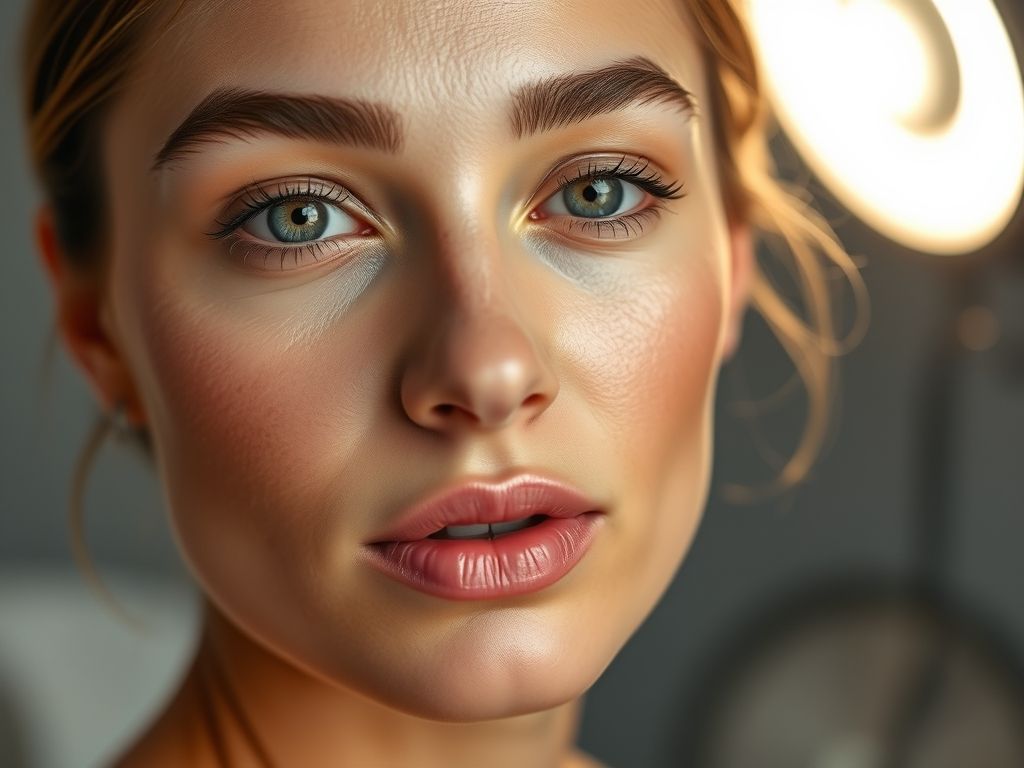In today’s world, where flawless selfies and video calls are the norm, achieving a luminous glow is more than just a trend; it’s a pursuit of confidence and self-expression. But what lies beyond the mirror? It’s the essential skincare and makeup prep that transforms a simple routine into an art form. In 2025, the beauty landscape is evolving, with a greater emphasis on sustainable beauty practices and personalized skincare regimens. We’ll explore the latest trends, techniques, and products that will help you unlock your most radiant self, focusing on the importance of a solid skincare foundation before diving into makeup. From understanding your skin type to mastering the art of layering products, this guide will provide you with all the tools you need to achieve that coveted luminous glow.
We’ll cover everything from the latest in hydrating serums and illuminating primers to the best practices for exfoliation and sun protection. Get ready to discover how to create a canvas that not only enhances your makeup but also nourishes and protects your skin.
Understanding Your Skin Type
The cornerstone of any successful skincare and makeup routine is understanding your unique skin type. Whether you have oily, dry, combination, or sensitive skin, knowing your skin’s specific needs will guide you in choosing the right products and techniques. Let’s delve into each skin type and the key characteristics to look for. Oily skin is characterized by excess sebum production, leading to a shiny appearance and a tendency for clogged pores and breakouts. Dry skin, on the other hand, lacks moisture, resulting in a tight, flaky, and sometimes itchy complexion. Combination skin presents a mix of both, with oily areas (typically the T-zone) and dry areas (such as the cheeks). Sensitive skin is prone to irritation, redness, and allergic reactions, requiring gentle and hypoallergenic products.
To determine your skin type, start by cleansing your face with a gentle cleanser and patting it dry. Wait for about an hour without applying any products. Observe how your skin feels and looks. If your skin feels tight and dry, you likely have dry skin. If it appears shiny all over, you probably have oily skin. If only your T-zone is shiny, you have combination skin. If your skin feels itchy or becomes red, you may have sensitive skin. Once you’ve identified your skin type, you can tailor your skincare routine accordingly, focusing on products that address your skin’s specific needs. For example, those with oily skin should opt for oil-free and non-comedogenic products, while those with dry skin should prioritize hydrating and moisturizing ingredients.
The Importance of Exfoliation
Exfoliation is a critical step in achieving a luminous glow, as it removes dead skin cells that can dull your complexion and clog your pores. By sloughing off these dead cells, exfoliation reveals the fresh, radiant skin underneath, allowing for better absorption of skincare products and a smoother makeup application. There are two main types of exfoliation physical and chemical. Physical exfoliation involves using abrasive scrubs, brushes, or sponges to manually remove dead skin cells. Chemical exfoliation, on the other hand, uses acids like AHAs (alpha hydroxy acids) and BHAs (beta hydroxy acids) to dissolve the bonds between dead skin cells, making them easier to remove.
When choosing an exfoliation method, consider your skin type and sensitivity. Physical exfoliants can be too harsh for sensitive skin, while chemical exfoliants may be too drying for dry skin. Start with a gentle exfoliant and gradually increase the frequency as your skin tolerates it. Over-exfoliating can lead to irritation, redness, and even breakouts, so it’s important to find the right balance. Aim to exfoliate 1-3 times per week, depending on your skin’s needs. Incorporating exfoliation into your routine will not only improve your skin’s texture and tone but also enhance the effectiveness of your other skincare products, allowing them to penetrate deeper and deliver better results. Ultimately, regular exfoliation is a key step in achieving a luminous and healthy-looking complexion.
Hydration is Key
Hydration is non-negotiable when it comes to achieving a luminous glow. Well-hydrated skin appears plump, radiant, and healthy, while dehydrated skin looks dull, tired, and prone to fine lines and wrinkles. Hydration comes from both internal and external sources, so it’s important to drink plenty of water throughout the day and use hydrating skincare products. Look for ingredients like hyaluronic acid, glycerin, and ceramides, which attract and retain moisture in the skin. Hyaluronic acid, in particular, is a powerhouse ingredient that can hold up to 1000 times its weight in water, making it an excellent hydrator for all skin types.
In addition to serums and moisturizers, consider incorporating hydrating masks into your routine. Sheet masks, for example, are soaked in hydrating serums and provide an instant boost of moisture to the skin. You can also use a humidifier, especially during dry winter months, to add moisture to the air and prevent your skin from drying out. Remember, hydrated skin is happy skin, and it forms the perfect canvas for makeup application. When your skin is properly hydrated, your makeup will glide on smoothly, look more natural, and last longer. So, make hydration a priority in your skincare routine, and watch your complexion transform from dull to luminous.
Product Recommendation:
- 3Pcs Face Body Paint, Professional Paint for Halloween Cosplay Costume Party, Full-coverage Multi-Color Cream Makeup Body Paint for Adult Halloween Cosplay SFX Makeup Paint (White+Black+Silver)
- 19PCS Cute Temporary Face Tattoos, Fake Freckles Tattoo Sticker, Valentine Heart Tattoo, Butterfly Fake Tattoo, Fairy Temporary Tattoos for Rave Accessories, Adult Kawaii Makeup Accessories for women
- UCANBE Face Body Paint Set-Athena Painting Palette,10 Professional Artist Brush,Large Deep Pan Ideal for Halloween Cosplay Party SFX Arty Stage Makeup
- Face Painting Kit for Kids Adults, Water Activated Body Face Paint, 15 Colors Water Based Facepaints Fx Makeup Palette ,Non Toxic Hypoallergenic Safe Facepaint for Halloween Party Birthday Cosplay
- 190 Colors Makeup Pallet,Professional Makeup Kit for Women Full Kit,All in One Makeup Sets for Women&Beginner,include Eyeshadow,Lipstick,Compact Powder,Eyeliner,Concealer(004-Black)
The Power of Primers and Illuminators
Primers and illuminators are the secret weapons for achieving a luminous glow with makeup. Primers create a smooth, even canvas for makeup application, while illuminators add a subtle shimmer and radiance to the skin. Primers come in various formulations to address different skin concerns, such as oil control, hydration, and pore minimization. Choose a primer that suits your skin type and the look you’re trying to achieve. For example, if you have oily skin, opt for a mattifying primer to control shine and prevent your makeup from sliding off. If you have dry skin, choose a hydrating primer to add moisture and create a dewy finish.
Illuminators, on the other hand, come in liquid, cream, and powder forms. Liquid and cream illuminators are best applied under foundation for a subtle, all-over glow, while powder illuminators can be used to highlight specific areas of the face, such as the cheekbones, brow bone, and inner corners of the eyes. When choosing an illuminator, consider your skin tone and the level of shimmer you desire. Fair skin tones look best with champagne or pearlescent illuminators, while medium to dark skin tones can pull off gold or bronze illuminators. Apply illuminator sparingly, as too much can make your skin look greasy. A touch of illuminator in the right places can instantly brighten your complexion and create a luminous, lit-from-within glow.
Sun Protection is a Must
Sun protection is not just a skincare step; it’s a necessity for maintaining healthy, radiant skin and preventing premature aging. Sun exposure is the leading cause of wrinkles, age spots, and other signs of sun damage, so it’s crucial to protect your skin from harmful UV rays every day, regardless of the weather. Choose a broad-spectrum sunscreen with an SPF of 30 or higher, and apply it liberally to all exposed areas of your skin, including your face, neck, and hands. Reapply every two hours, especially if you’re sweating or swimming.
In addition to sunscreen, consider wearing protective clothing, such as hats and sunglasses, to shield your skin from the sun. Look for sunscreens that are specifically formulated for the face, as they tend to be lighter and less likely to clog pores. There are also tinted sunscreens available, which provide a hint of coverage and can replace your foundation on days when you want a more natural look. Remember, sun protection is an investment in your skin’s future, and it’s the most effective way to maintain a luminous and youthful complexion. Make it a non-negotiable part of your daily skincare routine, and your skin will thank you for years to come.
Setting Your Makeup for Long-Lasting Radiance
Once you’ve perfected your skincare and makeup prep, it’s time to set your makeup for long-lasting radiance. Setting your makeup not only helps it stay in place all day but also prevents it from creasing, fading, or transferring. There are two main types of setting products setting powders and setting sprays. Setting powders are typically used to set foundation and concealer, while setting sprays are used to set the entire face.
When choosing a setting powder, consider your skin type. If you have oily skin, opt for a translucent or mattifying powder to control shine and absorb excess oil. If you have dry skin, choose a hydrating or illuminating powder to add moisture and radiance. Apply setting powder with a large, fluffy brush, focusing on areas that tend to get oily, such as the T-zone. Setting sprays, on the other hand, come in various formulations to address different skin concerns, such as hydration, oil control, and longevity. Choose a setting spray that suits your skin type and the look you’re trying to achieve. For example, if you want a dewy finish, opt for a hydrating setting spray. If you want your makeup to last all day, choose a long-lasting setting spray. Hold the setting spray about 8-10 inches away from your face and mist evenly, avoiding your eyes. Setting your makeup is the final step in achieving a luminous glow that lasts all day.
Achieving a luminous glow is a journey that combines the art of skincare with the magic of makeup. By understanding your skin type, prioritizing exfoliation and hydration, and using the right primers, illuminators, and sun protection, you can create a canvas that radiates health and beauty. Remember, the key to a luminous glow lies not just in the products you use but also in the consistency and care you put into your skincare routine. Embrace these tips and techniques, and unlock your most radiant self. In 2025, the focus is on sustainable beauty and personalized regimens, so adapt these practices to fit your unique needs and preferences. Let your inner glow shine through!


